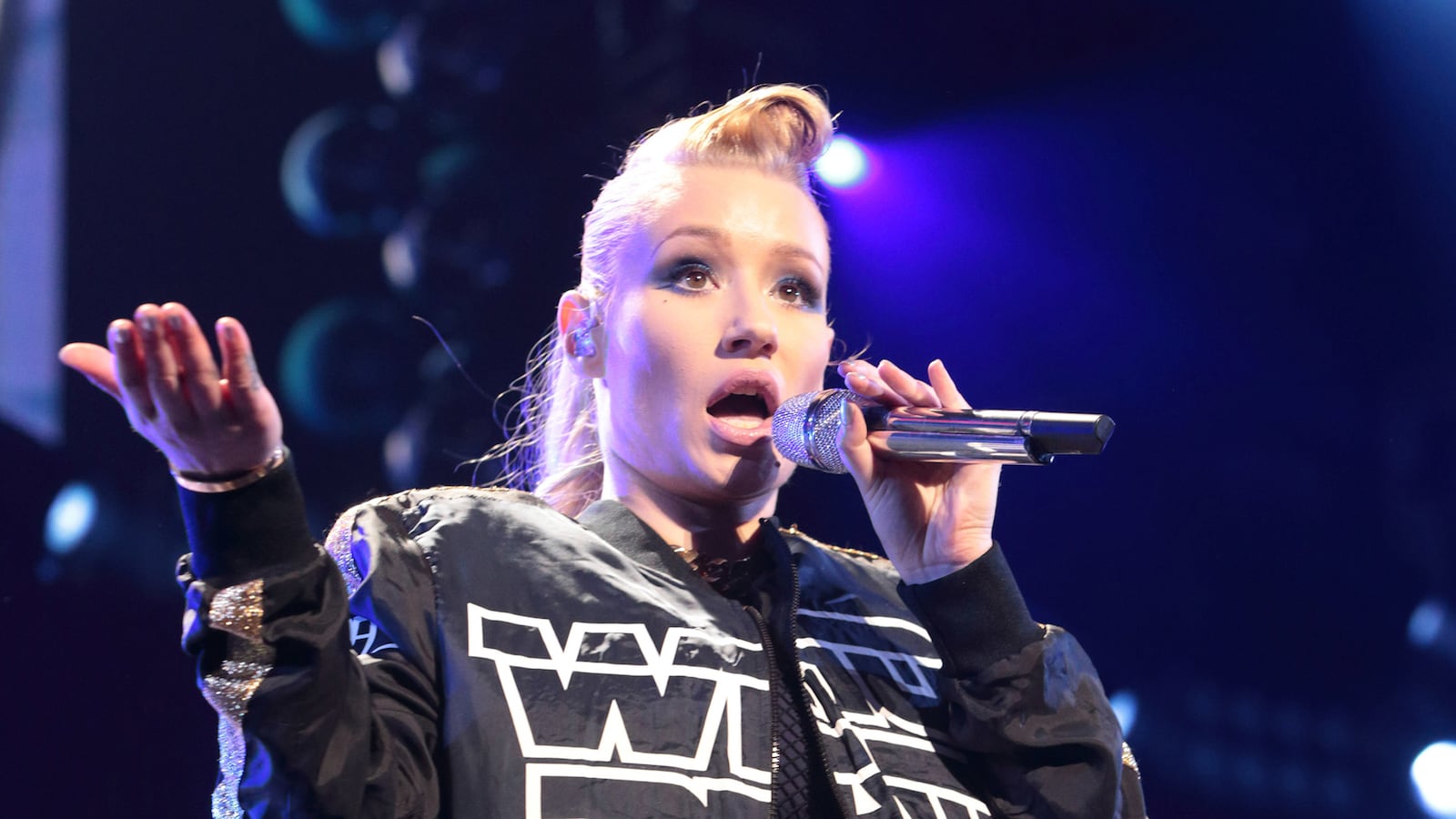Iggy Azalea was born Amethyst Amelia Kelly in New South Wales. A white, Australian, female recording artist and model, the woman now known as Iggy is currently the female rapper with the longest-leading number one single on the Billboard Hot 100. It’s increasingly difficult to listen to the radio without hearing Iggy’s boisterous “Fancy,” or her misguided attempt to lend fellow shiny-haired it girl Ariana some street-cred on “Problem.” But if you turn on the radio (or if you’re under the age of forty and listen to music on Spotify) looking for Iggy’s hot new flow, be forewarned: the 24-year-old Aussie doesn’t do much more than mimic the identifiably black spitting style of the American South.
You don’t have to watch interviews with Iggy to imagine how disparate her speaking voice is from her performative style—but you probably should in order to appreciate just how deep in drag she goes. As Gawker’s Rich Juzwiak has already noted, Azalea is “rap’s best drag queen”—and not just because “Iggy Azalea” is the product of the classic showman/woman’s formula of childhood pet + childhood street name.
What Azalea does best is mimicry. She might have adopted mentor T.I.’s sound, but she, unlike him, can’t trace her flow to the place she grew up or the specific culture she grew up within. Iggy’s influences hail from the South, and Iggy does not. Azalea’s performance is quite an achievement; after all, good drag is hard work, pretending takes a lot of practice, and the quest for “realness” is a lifelong journey. Whether or not you think that Azalea is a good rapper, you have to admit that she’s among the best at what she does; Brittney Cooper writes, “This Australian born-and-raised white girl almost convincingly mimics the sonic register of a downhome Atlanta girl.”
White rappers are always difficult to comprehend, difficult to deal with. Eminem pissed off a lot of people by using the N-word, and you’re not a real hip-hop fan if you’re not still processing Kendrick Lamar’s 2013 Grammy defeat at the extremely white hands of Macklemore. But Iggy Azalea is a special case: her story falls at the intersection of race, gender, commodification and co-option, and speaks to a history of black erasure that many artists feel they can no longer afford to ignore. Iggy Azalea herself might not even understand how polarizing and important a figure Iggy Azalea has become.
When Azealia Banks went on Hot 97 and complained “that Iggy Azalea shit isn’t better than any fucking black girl that’s rapping today,” she wasn’t just talking about Iggy Azalea and her Grammy nominations. The process of co-opting black music and selling it back to the adoring public in whiteface is as American as apple pie. Ragtime, blues, country, jazz, soul, and rock and roll were all pioneered or inspired by black artists. The twang we hear as emblematic of white country music is actually the direct descendant of black folk music banjo. Artists like Mick Jagger and Van Morrison obsessively revered and imitated African-American blues and rock musicians. This type of musical inspiration isn’t inherently bad—it’s practically unavoidable.
What’s disturbing is the fact that the names, faces, and recordings of those early black influencers have been all but erased. Sometimes this phenomenon has a one to one ratio, like when Chuck Berry’s rock and roll star was totally eclipsed by Elvis Presley, a white man who could “sound, feel, and perform black.” In this way, inspiration becomes appropriation, which leads directly to theft and erasure. White musicians are rewarded for their ability to imitate their black counterparts, and decades of black achievement and musical genius are swept under the rug, forgotten and ignored.
While there are two clear sides to this story, it’s not totally black and white. The issue of authenticity in American hip-hop is rich and nuanced.
Iggy Azalea is not a mastermind of this specific system of racial inequality, but that doesn’t negate the toxicity of her role. An artist like Macklemore receiving recognition over a black artist might strike many as deeply prejudiced and unfair—it’s hard to ignore the fact that his whiteness, his “palatability” to certain audiences, is a huge component of his profitability and appeal. Still, at least Macklemore sounds like a white guy from the Pacific Northwest. Conversely, Iggy’s alleged crime is twofold: she gets to profit off of her white appeal while simultaneously selling a black sound. She is making a huge career for herself by mimicking the vocal patterns and phrases of a Southern black girl—in effect, as Banks is arguing, stealing that nameless black girl’s own success in the process.
Of course, the issue of authenticity in hip-hop is already a complicated minefield for up and coming artists. Drake, one of the most popular rappers working today, was raised in suburban Toronto and proudly flaunts his sensitivity, proving that street cred is no longer the prerequisite it once was. The half-white, half-black artist is pioneering a move away from the traditional definition of authenticity through presenting an image and sound that feels more true to his real-life experience than some convention of hip-hop hardness.
While Drake is redefining realness, Iggy is effectively “passing.” She is using this technique, which generations of African-Americans have used for survival, for fame and profit. Iggy Azalea doesn’t wear blackface, but that doesn’t mean her drag performance doesn’t share some essential genetic code with the old-school American minstrel show.
As Azealia Banks was so quick to point out, Iggy Azalea has the luxury of appropriating blackness when she feels like it, and disengaging when she doesn’t. Banks tweeted in the wake of Mike Brown’s murder, “Black culture is cool, but black issues sure aren’t huh?” Iggy Azalea did not speak out about Ferguson, and hasn’t made any specific statements about race relations; instead, she responded “World issues shouldn’t be used as a poor excuse to promote fan battles.” Of course, a Ferguson sound bite would be an epic Catch-22; a white rapper like Iggy Azalea is damned if she does and damned if she doesn’t.
But the larger issue here is the fact that a white woman can co-opt blackness for her career, and yet feel no stake at all in the pressing issues faced by the culture that she is appropriating. Of course Iggy Azalea does not advertise a personal stake in race relations in America: her personal safety, socioeconomic status, sense of self or life itself is not affected or at risk. She is not a victim of systemic racism. As long as being black in America is seen and experienced as a problem, white rappers reaping the rewards of African-American appropriation will always be problematic.






